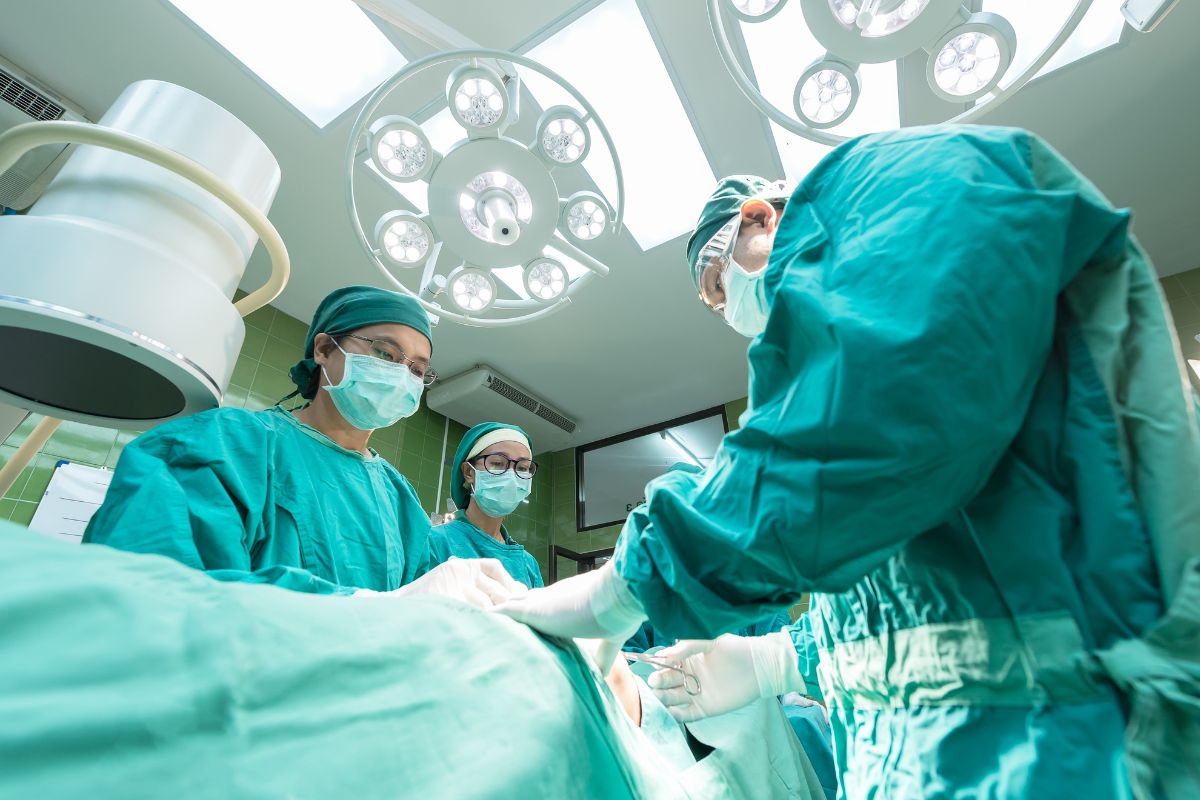Perfume Before Surgery: Why You Should Avoid It For Better Recovery

Are you scheduled for surgery soon?
If yes, you might reconsider wearing your favorite perfume to the operating room.
While it may seem trivial, wearing perfume before surgery can have serious consequences that most people are unaware of.
So, let’s dive into why avoiding smell before surgery is crucial for your recovery.
Avoid perfumes, deodorants, powders, lotions, and moisturizers before surgery to ensure a safe surgery and better recovery.
During surgery, sparks can fly from cauterization equipment or other electronic devices, and if your skin has an alcohol-based perfume on it, a fire could easily start.
Furthermore, fragrances with intense scents can trigger allergic reactions or asthma attacks, which could drastically impact your recovery time.
Now that we understand why perfume should be avoided before surgery, let’s explore other cosmetic products that patients should avoid.
Stick around to learn more.
We’ll also discuss what you can do to speed up your recovery time and ensure that your surgical procedure is successful.
In this article..
- The Dangers of Perfume in the Operating Room
- Allergic Reactions and Other Risks from Fragrances
- Other Cosmetic Products to Avoid Before Surgery
- Tips for a Successful Recovery After Surgery
- Preparing for Surgery: What to Do Before the Procedure
- The Importance of Following Preoperative Instructions
- Post-Operation Procedures: What to Expect and How to Manage Pain
- When to Call Your Surgeon: Signs of Complications After Surgery
The Dangers of Perfume in the Operating Room
Can you wear perfume before surgery?
Not.
It may sound like a minor issue, but the dangers of smell in the operating room are real.
Perfumes contain alcohol, which is highly flammable.
Imagine what could happen if an electric spark ignited the alcohol on your skin.
It would quickly spread and cause widespread burns.
Furthermore, fragrances can cause respiratory reactions like asthma attacks, so hospitals must ban perfumes, colognes, and other artificial scents.
It’s no secret that personal hygiene is critical in healthcare settings.
However, it’s equally essential to understand that perfume is not hygienic.
The fragrance chemicals can mix with sweat and bacteria, creating an unpleasant odor contaminating the sterile field.
This odor could easily affect the behavior of the surgical team, leading to unintentional mistakes during surgery.
Therefore, avoiding perfume, cologne, or any scent is essential before entering the operating room to maintain a sterile and safe environment.
While it’s natural to want to look and smell our best, it’s crucial to prioritize patient safety over our personal preferences.
This is especially true for healthcare professionals who work in the operating room.
It’s recommended that medical professionals avoid perfume or opt for “safe” scents such as fresh and clean fragrances.
However, even “safe” scents must be used sparingly since they can still pose risks to patients.
Ultimately, avoiding perfume entirely in the operating room is crucial for the safety and well-being of everyone involved in the surgery.
Allergic Reactions and Other Risks from Fragrances
You can’t wear perfume before surgery due to the risk of allergic reactions and other health risks associated with fragrances.
Symptoms of fragrance allergy include headaches, skin irritation, itching, rashes, sneezing, coughing, runny nose, breathing difficulties, dizziness, fatigue, and eye irritation.
It’s crucial to be mindful of others’ fragrances preferences to ensure a safe and healthy environment in the workplace.
Fragrances contain various chemicals that can cause different health risks, including allergic reactions that can be life-threatening.
Here are some of the fragrance-related dangers you need to know:
- Skin irritation: Fragrances can cause skin irritation, itching, and rashes when applied directly to the skin or inhaled by other people wearing fragrances. This can lead to hand eczema and indirect occupational consequences.
- Respiratory issues: Fragrances can trigger breathing difficulties in people with asthma, chronic obstructive pulmonary disease (COPD), and other respiratory conditions. This can lead to coughing, wheezing, shortness of breath, and chest tightness.
- Headaches and migraines: Fragrances can cause mild to severe headaches and migraines, especially in people with fragrance sensitivity. This can lead to fatigue, dizziness, and difficulty concentrating.
- Eye irritation: Fragrances can cause extreme redness, irritation, tearing, burning, and some swelling of the eyelids. This can lead to discomfort and temporary vision problems.
Therefore, avoiding using strong or overpowering scents that can cause discomfort, allergies, and other health risks is crucial.
Instead, opt for fragrances that are mild or fragrance-free to create a safe environment for yourself and those around you.
Remember, fragrance allergies and other related symptoms can be severe and stressful, so be mindful of others and take care of yourself by being fragrance-free.
Other Cosmetic Products to Avoid Before Surgery
You should avoid other cosmetic products, such as perfume, before surgery.
Perfumes contain chemicals that are harmful and can cause skin irritation or allergic reactions, especially after exposure to anesthesia.
Apart from the smell, there are other cosmetic products that you should avoid before surgery to ensure a successful procedure.
Here are more detailed explanations about other cosmetic products to avoid before surgery:
- Skincare products: Avoid using scrubs, toners, exfoliants, or acne treatments before surgery, as they can irritate the skin and cause inflammation.
- Teeth whitening products: Refrain from using teeth whitening treatments before surgery as they contain chemicals that can cause gum sensitivity and irritation.
- Hair removal products: Avoid waxing or shaving before surgery, as it can lead to skin irritation, ingrown hairs, or infections. It’s best to ask your surgeon for advice on which hair removal method to use.
Ultimately, following your healthcare provider’s instructions regarding which cosmetic products to avoid before surgery is essential.
It will help reduce the risk of complications, minimize infection, and ensure a successful procedure.
Tips for a Successful Recovery After Surgery
A successful recovery after surgery requires following your healthcare provider’s instructions, attending all follow-up appointments, and preventing infection by keeping your incision clean and dry.
Here are some additional tips to help ensure a successful recovery:
- Rest and take pain medication as advised to speed up recovery.
- Consume a balanced diet and stay hydrated to maintain good nutrition for healing.
- Get up and move around as soon as possible after surgery to prevent blood clots and promote healing.
- Grant yourself permission to rest when needed and seek support from family or friends if necessary.
Taking care of yourself and listening to your body’s needs during this time is essential.
Following these tips can help ensure a smooth and successful recovery after surgery.
Remember to consult with your healthcare provider if you have any concerns or questions.
Preparing for Surgery: What to Do Before the Procedure
Before the procedure, it’s essential to understand what will happen and ask any questions you have.
You should also talk to your healthcare provider about any medications you are taking, including supplements and vitamins.
It’s essential to follow their instructions, including stopping some medicines before the surgery to reduce the risk of bleeding.
Eating healthy foods, like fruits and vegetables, and staying active can help promote healing after the surgery.
Two weeks before the procedure, it’s recommended to eat nutritious, unprocessed foods like protein-rich meat, fish, or beans.
When preparing for surgery, it’s essential to ask your healthcare team about any specific instructions to follow before the procedure.
Depending on the type of surgery, they may ask you to stop eating or drinking for a certain amount of time before the procedure to avoid complications.
Following their instructions can help minimize the risks and improve the chances of a successful surgery.
Be prepared and make transportation arrangements for the procedure ahead of time.
You may need someone to drive you home as you can’t go after anesthesia.
Having someone to help you during the first few days of recovery is also recommended, as you may need assistance with daily activities.
Several other things can help prepare for surgery, such as quitting smoking, reducing alcohol intake or quitting altogether, and managing stress levels.
Smoking can delay healing time, and alcohol can interact with the anesthesia or lead to complications during and after the procedure.
Working stress levels can help reduce anxiety before the procedure and improve the chances of a successful outcome.
Taking slow and deep breaths, meditating, or practicing gentle yoga exercises such as stretching can be especially helpful.
The Importance of Following Preoperative Instructions
Following preoperative instructions is crucial for a successful surgical experience.
To ensure that you have the safest surgery possible, it is essential to follow the directions given to you by your healthcare provider before your procedure.
Here are some reasons why:
- Pre-operative assessment is required for most elective surgeries to ensure you can undergo surgery.
- Not following pre-operation instructions can increase your risk of complications during the surgery.
- If you take prescription medication, you may need to pause or adjust the dose before surgery.
- It is essential to follow any specific instructions given about fasting or other preparations before surgery.
- Pre-operative information sessions with a nurse can help reduce anxiety and help you prepare effectively.
It’s important to remember that following pre-operation instructions can play a critical role in ensuring the success of your surgery.
By doing your part in preparing for surgery, you can help ensure a safe and successful outcome.
Post-Operation Procedures: What to Expect and How to Manage Pain
Can wearing perfume before surgery affect postoperative pain management?
Yes, it can.
After surgery, it’s expected to feel uncomfortable and experience pain.
That’s why managing pain is crucial for a successful recovery.
There are several ways to control pain after surgery, and following your healthcare provider’s instructions regarding medication and dosage is essential.
But did you know that perfume or fragrances can interfere with anesthesia and increase the risk of post-operation complications.
It’s best not to wear anything with a strong scent on the day of your surgery.
Several techniques and methods can be used to manage pain after surgery, including medications, relaxation techniques, physical therapy, and non-drug pain relief options such as guided imagery, deep breathing exercises, and meditation.
Here are some practical tips to help manage pain effectively:
- Medications: Follow your doctor’s instructions on medication management for pain relief after surgery.
- Physical therapy: Physical therapy can help improve mobility and reduce pain after surgery. Your healthcare provider may offer special exercises or movements to help you recover faster.
- Relaxation techniques: Deep breathing exercises, progressive muscle relaxation, and guided imagery can help reduce stress and anxiety, which are associated with pain.
- Non-drug pain relief: Acupuncture, massage, and hot and cold therapies can reduce discomfort and swelling.
It’s essential to communicate with your healthcare provider about any pain or discomfort you may be experiencing, so they can adjust your treatment plan accordingly.
Managing pain after surgery is vital for a successful and speedy recovery.
By changing your treatment plan to your individual needs, you can ensure a smoother postoperative journey.
When to Call Your Surgeon: Signs of Complications After Surgery
Feeling uneasy after surgery is common, but sometimes symptoms can be a sign of a complication.
If you experience any of the following symptoms after surgery, it’s essential to contact your surgeon immediately.
- Chest pain
- Troubled breathing
- Sweating
- Fast heartbeat
- Fainting
- High fever over 101 F
- Anesthesia reaction
- Blood clots
- Difficulty with bathroom use
- Wound infection
Don’t ignore your symptoms or wait for them to go away alone.
Reaching out to your healthcare provider immediately can prevent severe complications and ensure a quicker recovery.
Once you contact your surgeon, they will evaluate your symptoms and may adjust your treatment plan accordingly.
They may recommend additional medications, provide instructions on how to care for yourself, or even have you come in for a follow-up appointment.









